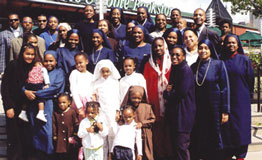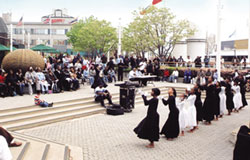CHARLENEM

In over 37 communities nationwide, family advocates and activists vowed to celebrate, promote and preserve the institution of marriage on March 28, Black Marriage Day (BMD).
“Our marriages are in serious trouble, regardless of income, education, background, and a host of other factors. Once we had the highest marriage rate in the country, and now, we have the lowest,” stated Nisa Islam Muhammad, founder of the Wedded Bliss Foundation and BMD, which aims to help communities develop healthy marriages toward community empowerment.
Marriage advocates note that the covenant has been at risk for a long time. The fact that the U.S. no longer collects detailed marriage statistics is an example. In its October 2003 Provisional Vital Statistics Report, the National Center for Health Statistics listed the number of 2003 marriages at 207,000, compared to 214,000 in 2002.
Despite this dilemma, Ms. Muhammad, a divorced mother of five who wanted something better for her children, said she was tired of hearing negatives about Black marriages, and decided to settle on the best, rather than the poor, part of the institution.

Last year, she launched the Foundation, Black Marriage Day, and the Community Healthy Marriage Initiatives (CHMI), all sources of support for single, engaged or married couples, both on the brink of divorce and happily married and looking to strengthen their tight bond.
This year, churches, community organizations and individuals from Atlanta, Ga. to Washington, D.C., held seminars, workshops and interactive lectures on the necessity and benefits of healthy Black marriages.
In Los Angeles, nearly 100 participants enjoyed a three-day celebration, kicked off with a rally, says La Grande Mason of the L.A. African American Healthy Marriage Initiative, who organized the celebration, themed “Supporting Black Marriages and Family.”
The Initiative awarded four celebrity and community couples, including Bill and Camille Cosby, and Frank and Carrie Jones (married 64 years), in the categories of Newlywed Couple, Encouraging Couple, Pioneer Couple, and Lifetime Couple. The event was co-sponsored and managed by HALO Inc.(Helping Angelinos Live Optimistic), and Sunday at Liberty Tabernacle Ministries with a Black Marriage Day sermon by Pastor David Gross, “How A Snake Messed Up A Good Thing.”
In Washington, D.C., married and single participants who attended a one-day seminar received informative packets that contained the Black Marriage Day Pledge, and listings of books and websites that help foster positive marriages.
Monica 2X, whose company A First Class Affair hosted the activities, said she understood the importance of the day, so less-than-anticipated attendance did not hamper plans for the mini-conference.
“There is such a great need within the Black community for a day like Black Marriage Day. We set out to give participants in our community a day of activities that provided tools and resources that will help them on their personal journey towards wedded bliss,” she said.
According to Dr. Sheron Patterson, of Saint Paul United Methodist Church in Dallas, not everyone believes Black marriages are in trouble or is necessary to promote.
After hearing Ms. Muhammad speak on Black Marriage Day last year, she decided she wanted to join in the effort, but was dismayed by the unexpected backlash and skepticism from both single and married people on the decision to promote strong Black marriages.
“They were agitated and angry that there was a day for married people. They felt like we were picking on them,” she said, referring to the response by local singles.
With 20 years of experience in relationship ministries, she noted that, while some children from single parent households fair well, that is not the norm. Although she was not prepared for the negativity, she forged ahead with church and citywide celebrations with a marriage enrichment seminar called “Taking Your Marriage to the Next Level.”
She said that people must realize that the whole institution of marriage is suspect, with over 50 percent of Blacks growing up in single family homes. Where some young people’s parents are divorced, or were never married, the youth do not hold marriage in high esteem, she added
Young fiances, 25-year-old Jamari and 23-year-old Monique of Oakland present a different vision of youth and marriages.
Neither have ex-spouses or “baby mama drama.” Yet, unlike the “playa” images of promiscuity spewed in the music industry, the two embarked three months ago on a journey toward commitment under God.
“Society wants us to keep being a player, but that is really a conflict with what the Lord wants us to do. As the marriages go, so will the society go,” Jamari explained. He is pleased that traditional male-female marriages are on the “comeback” because they produce good neighborhoods.
“Marriages are not honored anymore because of the values people are being taught now. Living together in society, having children and getting married is a last resort,” she said. She is not bashing people born out of wedlock, she continued, but simply noting that having her father present gave her a sense of comfort, support and guidance.
(Contact the Wedded Bliss Foundation at P.O. Box 76947, Washington, D.C. 20013 or (877) 907-0599 or email:[email protected].)












